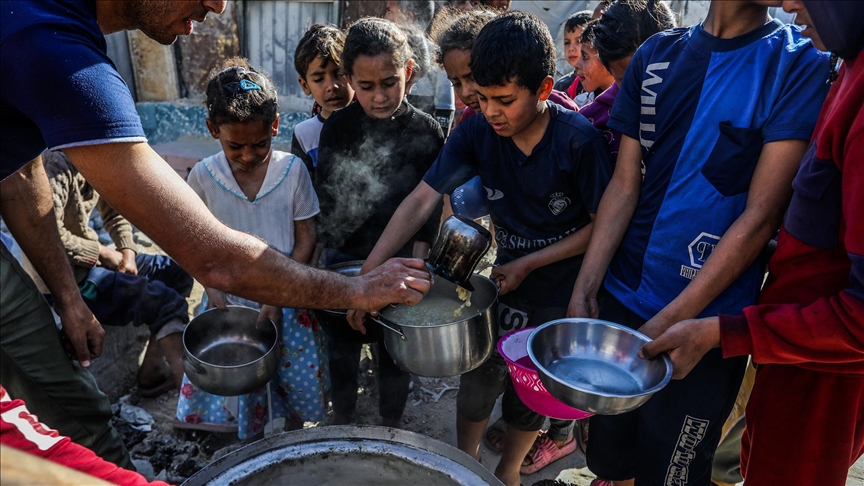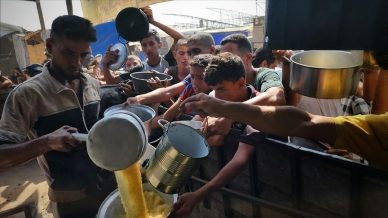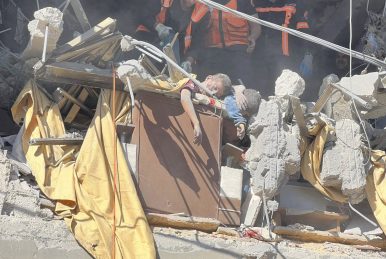GAZA, (PIC)
More than two million citizens in the Gaza Strip are facing a multifaceted war, with Israel being the main actor. However, they see the greed of traders and market monopolists as the harshest daily battles they fight.
Citizens complain that the market has turned upside down since March 2, after the Israeli occupation authorities closed the crossings following the end of the first phase of the ceasefire agreement in Gaza on January 19, 2025.
Osama Amer says that goods have gradually disappeared from the markets, and what is available is sold at doubled prices, reminiscent of the first famine during the genocide war. Amer, a father of a family of five, realizes that the closure of the crossings is the reason for the lack of vegetables in the markets, as they cannot be stored by traders amid the ongoing power outages. However, the thirty-something young man does not hide his anger at the traders who sell basic goods such as sugar, oil, legumes, and canned foods.
He adds that prices have risen by 300%, and some items have completely disappeared from the market after being abundant and sold at pre-war prices, such as sugar.
Feelings of fear and helplessness
Mahmoud Radwan shares Amer’s dissatisfaction regarding the general condition of the markets in the Gaza Strip, from the north in Beit Lahia to the south in Rafah. He says that the sudden resumption of the Israeli occupation army’s unjustified attacks on the Strip has doubled their feelings of fear and helplessness after they had caught their breath for fifty days.
Before the genocide, Radwan worked in a sweets factory and earned a daily wage ranging from 50 to 70 shekels, noting that Ramadan was considered a big season for making oriental sweets and chocolates. “Today, I can barely secure food for Iftar. Personally, I rely on the provisions of international and local relief organizations and local charity kitchens.”
He points out that in recent months, he had gotten used to meeting his family’s needs by selling surplus goods to provide cash, “which enables me to secure what the children ask for, even if only the bare minimum. But today, what we obtain cannot meet the family needs since the crossings were closed and goods have disappeared from the markets.”
Since early March, Israel has closed the only commercial crossing of Kerem Shalom, which supplies the Gaza Strip with goods, food items, and fuel. The suspension of truck deliveries carrying aid and food items has led to a severe shortage in the markets, and store shelves were gradually emptied of essential goods.
First stages of famine
The Government Media Office (GMO) in Gaza announced on Wednesday that the Strip has entered “the first stages of famine” due to the ongoing Israeli siege and the closure of crossings to aid and goods since March 2.
Ismail Thawabteh, the GMO director general, stated, “The Gaza Strip has officially entered the first stages of famine, after nearly two million people have lost their entire food security.”
He adds that this comes amid an “unprecedented humanitarian disaster” experienced by the Palestinians in the Strip due to the closure of crossings, halting charity organizations, and the interruption of humanitarian aid.
Thawabteh clarifies that the markets in the Strip have become devoid of “basic food items due to the closure of crossings, depriving our Palestinian people of the simplest life essentials.”
Water crisis
He pointed out that dozens of bakeries have stopped working due to the ban on fuel imports and tightening of the siege, which has led to a reduction in the quantities of bread available for the people of the Strip “and exacerbated the suffering of civilians facing the specter of hunger.”
He added that dozens of water wells have also stopped working, worsening the thirst crisis, warning of a real danger facing the Palestinians due to the lack of potable water.
The closure of crossings has also multiplied the daily suffering of Palestinian families, who have started relying on firewood as a primary substitute for cooking gas, which has run out in the Strip, according to Thawabteh.
He noted that the halt of fuel supplies has led to “near-total paralysis in the transport and communication sector, hindering citizens’ movement and obstructing patients and injured individuals from reaching hospitals and medical centers, threatening the lives of thousands of patients and injured.”
Thawabteh warned of “the complete collapse of life in the Gaza Strip in the coming days if the Israeli aggression does not stop and the crossings are not opened immediately.”
He appealed to the international community and human rights organizations for “urgent intervention to stop the Israeli aggression and hold (Israeli) war criminals accountable before international courts,” and to urgently deliver humanitarian assistance to avert a real humanitarian disaster threatening the lives of millions.
Reduction of assistance
Meanwhile, the United Nations Office for the Coordination of Humanitarian Affairs (OCHA) warns that more than one million people in the Gaza Strip will face severe food shortages if humanitarian aid deliveries do not resume due to Israel’s continued closure of crossings.
In a statement on its website on Wednesday, it emphasized that the available stocks in the Strip are depleting rapidly, indicating that UN partners dealing with the crisis have sharply reduced food aid, suspended the distribution of flour and fresh food items, and decreased the quantities of hot meals in public kitchens.
The office also warned that if the situation remains unchanged, at least 80 out of 170 public kitchens in the Strip will have to close within a week or two.
Food collapse
Economist Ahmad Abu Qamar warns that the Gaza Strip is rapidly approaching a real famine amid the choking siege and food supply shortages.
Abu Qamar stated in remarks reported by the Palestine newspaper, “We are no longer talking about poverty or unemployment; we are facing a complete food collapse. People are no longer looking for complete meals but dream of a can of fava beans or a handful of lentils.”
He pointed out that vegetable prices have reached exorbitant levels, “a kilogram of cucumber is now sold for 14 shekels while there is no type of meat available. These prices exceed the capacity of the Gazan citizens, most of whom have become without any source of income since the beginning of the war.”
Abu Qamar adds, “The siege is not new to Gaza, but the situation today is becoming tighter, and if the closure of the crossings and the prevention of food imports continue, we are rapidly heading towards a real famine threatening the lives of hundreds of thousands in the Strip.”
He concluded his remarks with a stern warning, “Gaza today is not just facing a food crisis, but a danger that threatens its very existence. If the world does not act swiftly, we will witness an unprecedented humanitarian catastrophe.”
On March 2, Israel closed the Gaza crossings and prevented the entry of humanitarian aid and commercial goods, claiming that Hamas refused to respond to the proposal of the U.S. Middle East envoy, Steve Hanke.
Hamas strongly denied this and pointed to the Netanyahu government’s refusal to initiate the second phase of the agreement and its efforts through military pressure to release more Israeli prisoners without fulfilling the commitments of this phase, particularly ending the genocide and withdrawing completely from the Gaza Strip.
With U.S. support, Israel has been committing genocide in Gaza since October 7, 2023, resulting in more than 161,000 Palestinian martyrs and injured, most of whom are children and women, and over 14,000 missing persons.














